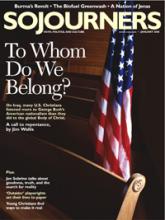One Sunday morning an all-too-familiar scene unfolded in the sacristy at Iglesia El Carmen in Santa Tecla, outside San Salvador. Giggling children blessed with the blood of the coffee gods surrounded an elderly Spanish priest, showering him with warmth and adoration. It was an image of an encounter—European and native—mythologized over centuries in Latin America from the first conquistador who disembarked with a gun in one hand, the cross in the other, and a mandate to “civilize.”
But the church pastor is no ordinary priest and this is no ordinary encounter. The pastor, Jesuit Father Jon Sobrino, is a world-renowned liberation theologian. He says these children, the country’s poor, offer salvation. Through them the mystery of God is revealed. “La gloria de Dios es el pobre,” declared slain Salvadoran Archbishop Oscar Romero—“The glory of God is the poor.” That aphorism hangs next to a banner with a crucified Jesus on the church’s otherwise sparse altar.
Romero’s words ring in Sobrino’s ears. They influence his many published writings and form the cornerstone of liberation theology, a strain of Catholicism that emerged as a force in Latin America during the 1970s, promoting Jesus as liberator of the oppressed and impoverished. But in a sanction published in March 2007, the Vatican branded the ideas contained in two of Sobrino’s books as “erroneous or dangerous,” thus discouraging Catholic seminaries and universities from teaching his work.
Read the Full Article

